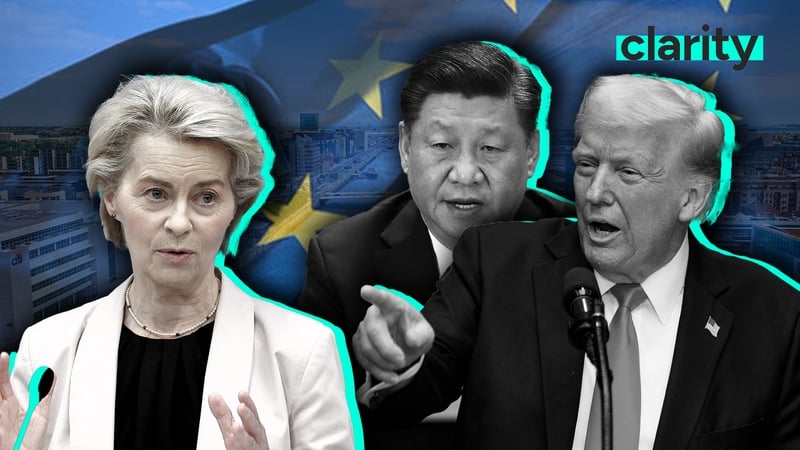The Anti-Coercion Instrument (ACI) has been dubbed the European Union’s ‘big bazooka’ – a nuclear option that could be deployed if a trade war with the US escalates.
It would allow the EU to target American tech firms and banks by blocking access to markets, suspending intellectual property rights and banning the distribution of digital services.
Ahead of Wednesday’s announcement of a tariffs pause by US President Donald Trump, there were growing calls within some EU quarters to use the ACI.
But how powerful is this ACI, how would it work, what would it mean for Europe, and is it likely to ever be deployed against the US?
ACI: A weapon to protect trade
In 2023, the EU reached agreement on the ACI to enable it to take countermeasures against a non-EU country using a wide range of restrictions related to trade, investment and funding.
It provides a means to act in situations where a country tries to interfere in the policies of the EU or a member state, by applying or threatening to apply measures affecting trade or investment.
At the time of the agreement, the Chair of the European Parliament’s Committee on International Trade, Bernd Lange, told reporters that “sometimes it’s necessary to put a gun on the table, even knowing that it’s not used day by day”.
According to the EU, the aim of the anti-coercion tool is to act as a deterrent, allowing trade conflicts to be resolved through negotiation. It is there as a last resort, should talks fail to resolve an issue.
The need for this weapon was borne out of tariff concerns during the first US Trump presidency, as well as trade restrictions China imposed on Lithuania after it announced it was improving relations with Taiwan in June 2021.
“The anti-coercion instrument will be the EU’s new tool to fight economic threats and unfair trade restrictions by non-EU countries,” the European Parliament said in a statement at the time of the ACI agreement.
“Sometimes countries resort to blackmail or trade restrictions to give their companies an unfair advantage, leading to trade conflicts with the EU,” according to the statement.
In the Lithuanian example, companies from that country reported difficulties renewing or concluding contracts with Chinese firms. They also had issues with shipments not being cleared and problems filing customs paperwork.

Europe felt it needed a weapon to retaliate against non-EU countries that used trade to try to force a change in policies.
“This all goes back to the later part of the last decade when China became much more aggressive in a range of ways,” said Dan O’Brien, Chief Economist at the Institute of International and European Affairs (IIEA).
“Europe needed to have a coordinated, clear instrument that other countries could see, and that would allow them to come together and not let an individual country be picked off.
“The US has had something like this for years, back in the 70s they introduced something similar as part of their trade policy, measures that could hit other countries that worked against them economically,” Mr O’Brien said.
How would the ACI be deployed?
The ACI could be deployed by the EU to target US tech firms and banks.
For example, it could be used to ban the sales of advertisements on social media platforms, suspend paid subscriptions and restrict access to certain markets.
Streaming services could see their revenues hit and tech companies could be prevented from charging for cloud storage services and operating system updates.
US banks could be prevented from operating in European markets and American companies could be blocked from competing for government contracts.
The ACI would, in theory, allow the EU to revoke US patents and restrict intellectual property rights, although Dan O’Brien of the IIEA said it is unclear how this would happen in practice.
“For example, if you look at intellectual property that’s kept in Ireland by American pharmaceutical companies or tech companies, how exactly that would work?,” he said.
“I don’t think anybody is quite certain about that and there has never really been a precedent around this.
“But I think the uncertainty is part of the reason it’s seen as a nuclear option.
“You never want to use your nuclear weapons, but you want to make sure that people are uncertain as to exactly how bad it could be for them if they threaten you,” he added.
Mr O’Brien also believes that many of the measures covered by the ACI are steps that could be taken on an individual basis anyway by the EU.
“All of this stuff could be done individually, and I don’t see it being as groundbreaking as some people maintain it to be,” he said.
“Whether it’s limiting companies access to the European market, export controls, or cutting businesses out of public procurement, all of these things could be done anyway.
“But I suppose it brings it all together in a single place where other countries can see exactly the sort of measures could be taken,” he added.
Divisions over the ACI

According to recent media reports, France and Germany had been pushing for the ACI to be used against US tech firms. On Thursday, European Commission President Ursula Von der Leyen referenced the ACI prominently in a major interview with the Financial Times.
Last week, the FT also reported that Italian Prime Minister Giorgia Meloni was coming under pressure from other member states to use the ‘big bazooka’ to hit US services exports.
Deploying the Anti-Coercion Instrument would require a qualified majority, that is 55% of the EU’s 27 member states, representing at least 65% of the union’s population.
If Italy were to join those in the yes camp it would give that side a significant boost.
Given the importance of the tech sector here, Ireland would very much be in the no camp when it comes to using the ACI in this way.
On Monday, the Tánaiste said its use would be an “extraordinary escalation”.
Speaking at an emergency meeting of EU trade ministers in Luxembourg, Simon Harris said “if you were to get into that space, it would be an extraordinary escalation at a time when we must be working for a de-escalation”.
“It is in many ways the nuclear option if you start talking about the use of the Anti-Coercion Instrument. What we need to do here is step-by-step in a measured way, consider how best to respond,” Mr Harris said.
Dan O’Brien of the IIEA doubts if the ACI will ever be deployed against the US.
“Speaking to people in the European Commission, I really don’t think there is an appetite for this,” he said.
“I think the EU, rather than pulling out the bazooka, will want to go more gradually and escalate in a less utterly aggressive way.”
“I think it’s far more likely in the long term that the ACI could be deployed against China if, for example, there was to be an invasion of Taiwan,” he added.
Trade tensions between the EU and US have eased slightly since Wednesday’s announcement of a pause in tariffs but in her FT interview, Ms von der Leyen warned that a levy on the digital advertising revenues of US tech firms has not been ruled out if negotiations fail.
The “big bazooka” may have been put away for now but it is clear that US tech could still be in the firing line, and with that, their Irish operations.




